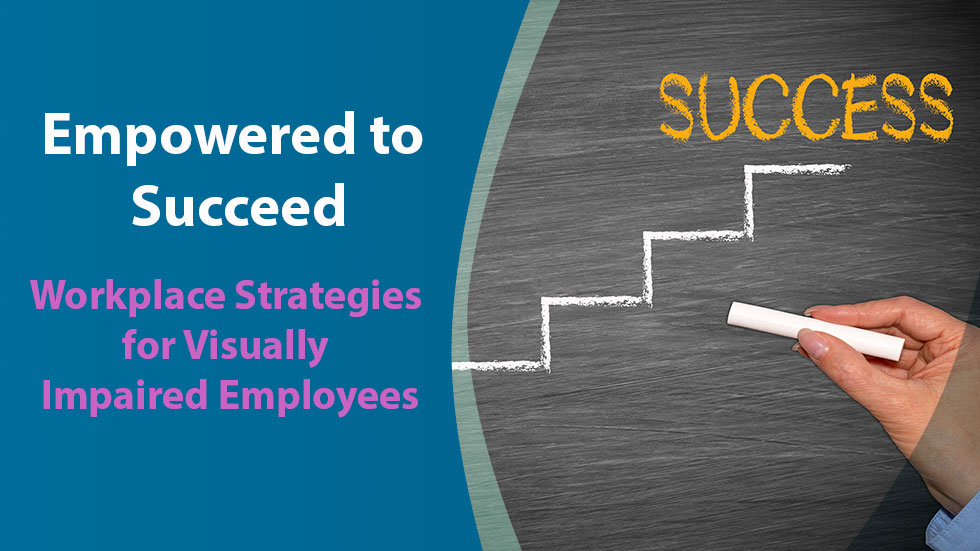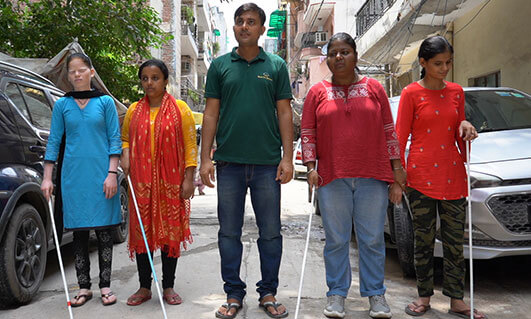
Visual impairment should never be seen as an obstacle to achieving career success. With the right strategies, tools, and mindset, individuals with visual impairments can not only thrive in the workplace but also excel in their chosen professions. In a world that increasingly values diversity, the skills and perspectives that people with visual impairments bring to the workplace are not only valuable but also vital. In this blog, we’ll explore practical strategies for visually impaired individuals to succeed in their careers and create an inclusive, empowering work environment.
1. Embrace Your Strengths
One of the first steps to career success as a visually impaired individual is embracing your strengths. Visual impairment often comes with heightened skills in other areas, such as:
- Attention to Detail: Many visually impaired individuals develop a keen attention to detail, relying on their other senses to analyze situations thoroughly.
- Problem-Solving: Navigating a sighted world without full vision often requires creative problem-solving, which can translate into valuable skills in the workplace.
- Resilience and Adaptability: The ability to adapt to challenges and persevere despite obstacles can be a unique strength in any profession.
Recognizing and building on these strengths can help shift the focus from what may be perceived as limitations to what can be done effectively, ensuring a greater sense of confidence and competence in the workplace.
2. Leverage Assistive Technologies
Advancements in assistive technology have significantly transformed how visually impaired individuals work, increasing productivity and independence. Leveraging these technologies can empower individuals to navigate tasks that may otherwise be challenging.
-
Screen Readers and Voice-Controlled Software: Tools like JAWS (Job Access With Speech) or NVDA (NonVisual Desktop Access) are powerful screen readers that can read text on a screen aloud. These tools can be integrated with word processors, email clients, and web browsers to ensure individuals can access and manage documents, emails, and other software with ease.
-
Voice Assistants: Virtual assistants like Siri, Google Assistant, or Amazon Alexa can help manage schedules, set reminders, and perform various work-related tasks hands-free.
-
Braille Displays and Keyboards: For those who prefer tactile feedback, Braille displays provide a way to read documents, and Braille keyboards facilitate writing and editing.
-
Smartphone Apps: A wide range of apps is designed specifically to assist visually impaired individuals in the workplace, such as Be My Eyes (for live assistance through video calls) and Aira (which connects users to trained professionals who provide visual information).
Investing in the right assistive technology can make a significant difference in both day-to-day tasks and long-term career progression.
3. Develop Strong Communication Skills
Effective communication is crucial in any workplace, and visually impaired individuals may need to develop specific strategies for navigating conversations, meetings, and presentations.
-
Verbal Communication: Clear, concise verbal communication is essential for building professional relationships and ensuring understanding. Being able to articulate ideas effectively and confidently is a key component of career success.
-
Use of Technology for Communication: Email, instant messaging, and video conferencing are common tools in the modern workplace. Familiarizing oneself with accessibility features on platforms like Zoom, Skype, or Microsoft Teams can help in ensuring that communication is seamless, regardless of visual impairment.
-
Advocating for Yourself: Clear and respectful self-advocacy is important in the workplace. Being able to discuss your needs with supervisors and colleagues—whether it’s requesting a screen reader or asking for task modifications—helps create a more supportive environment.
4. Build a Support Network
Having a strong support network is vital for career growth and mental well-being. For visually impaired individuals, this network may consist of mentors, colleagues, friends, and family who provide encouragement, advice, and resources.
-
Mentorship: A mentor who understands the unique challenges of visual impairment can provide valuable guidance. Mentors can help with navigating career decisions, offer insight into workplace dynamics, and act as a sounding board for ideas.
-
Peer Support Groups: Many organizations and advocacy groups offer opportunities for visually impaired individuals to connect and share experiences. These groups can provide emotional support, career advice, and professional development opportunities.
-
Employer Support: Ideally, a workplace should foster an inclusive environment where individuals with disabilities feel supported. Having a manager or HR representative who is receptive to feedback and willing to accommodate specific needs is crucial.
5. Focus on Professional Development
Continuing education and skill-building are key components of career success. For visually impaired professionals, pursuing ongoing development is an excellent way to stay competitive and grow within their field.
-
Skill-Building: Enroll in workshops, webinars, and training programs to develop skills relevant to your industry. Many online platforms, such as Coursera and Udemy, offer accessible courses in a wide range of subjects. Additionally, some organizations provide leadership training specifically for individuals with disabilities.
-
Networking: Networking is a powerful tool for career advancement. Attend virtual events, industry-specific conferences, and career fairs that cater to professionals with disabilities. Engaging with other individuals in your field can lead to new opportunities and collaborations.
-
Certifications and Degrees: Pursuing further qualifications, such as certifications or advanced degrees, can increase job prospects and career growth. Many institutions offer accessible learning resources and accommodations for students with disabilities.
6. Request Reasonable Accommodations
Under laws such as the Americans with Disabilities Act (ADA) in the U.S. or the Rights of Persons with Disabilities Act in India, employees with disabilities are entitled to reasonable accommodations. These accommodations might include:
- Flexible Work Hours: Adjusting work hours to accommodate medical appointments or fatigue can improve work-life balance.
- Modified Workspace: Adjustments like larger text on monitors, assistive devices, or flexible seating arrangements can make a significant difference.
- Access to Materials: Requesting documents in accessible formats (Braille, audio, or large print) ensures you have the necessary tools to complete tasks effectively.
It’s essential to communicate your needs with your employer and work collaboratively to find solutions that allow you to perform your job successfully.
7. Maintain Work-Life Balance and Mental Well-Being
Thriving in the workplace isn’t just about productivity; it’s also about mental well-being and a healthy work-life balance. Managing stress, setting boundaries, and maintaining a positive outlook can enhance career success.
-
Stress Management: Stress management techniques such as meditation, mindfulness, and exercise can help reduce anxiety and increase focus.
-
Self-Care: Make time for hobbies, relaxation, and social activities outside of work to maintain a sense of balance and avoid burnout.
-
Seeking Support: If the challenges of the workplace become overwhelming, seeking support through counseling, peer groups, or talking to an HR representative can help address issues before they escalate.
Conclusion
Career success for individuals with visual impairments is achievable with the right strategies, mindset, and tools. Embracing strengths, leveraging assistive technology, building strong communication skills, and seeking support are essential elements for thriving in the workplace. Moreover, requesting accommodations, focusing on professional development, and maintaining a healthy work-life balance are key to long-term career growth and satisfaction. By cultivating resilience, confidence, and determination, individuals with visual impairments can unlock their full potential and make meaningful contributions in any workplace.





